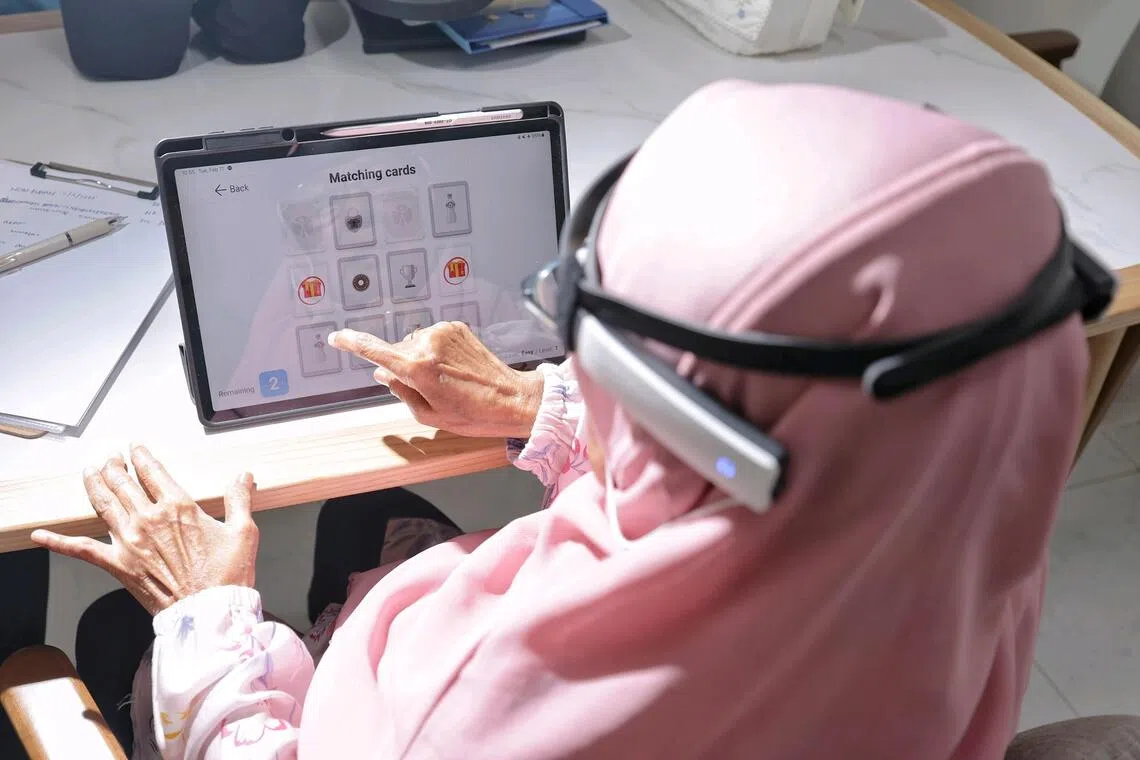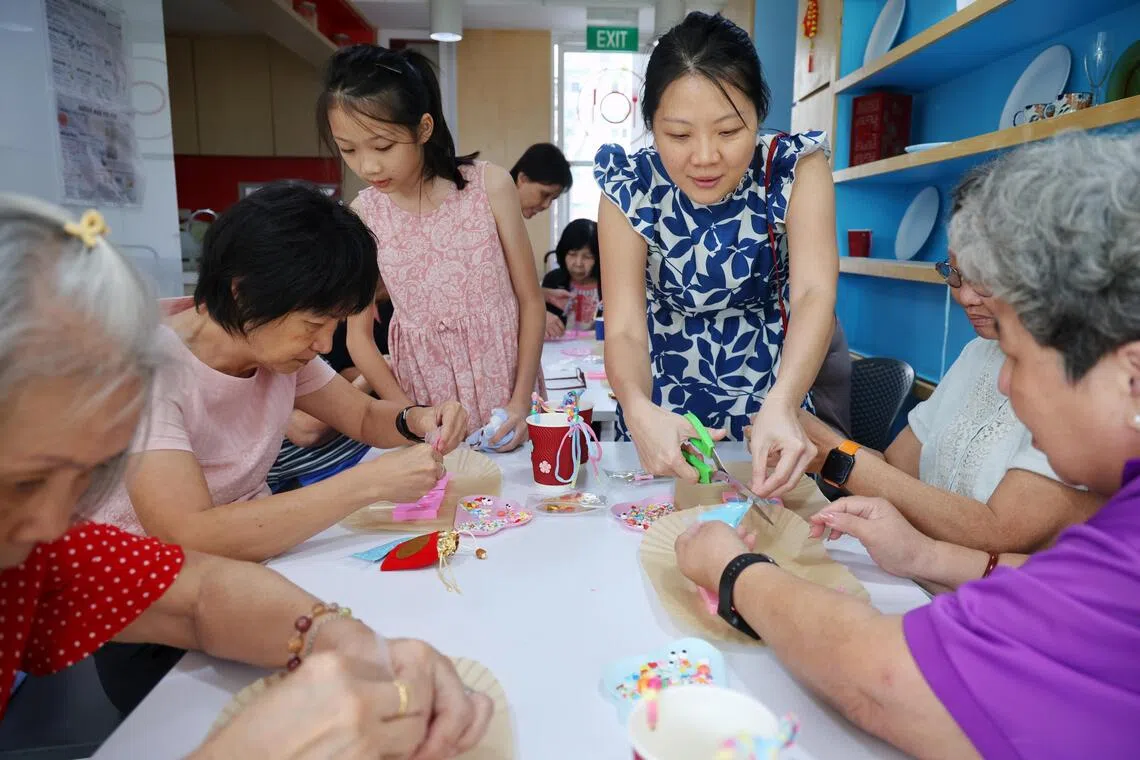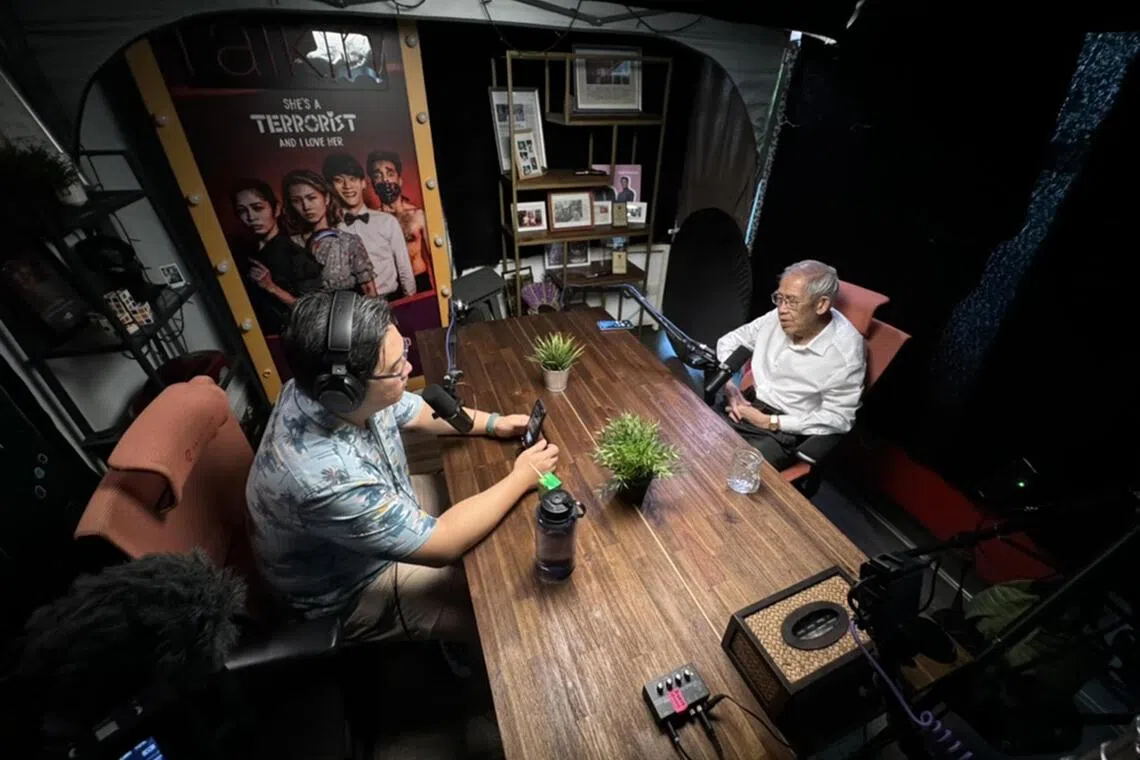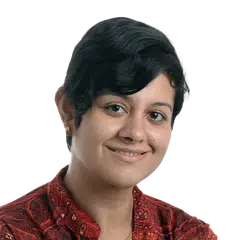Tapping tech for eldercare: How brain training, podcasts make ageing easier and fun
Sign up now: Get ST's newsletters delivered to your inbox

Madam Rupiah Sarwan playing a game on a tablet as part of cognitive therapy at home. The headband evaluates her brain function.
ST PHOTO: KEVIN LIM
SINGAPORE – Singapore is expected to be a super-aged society by 2026 as more than one in five here will be aged 65 or older. From brain training systems to sensors primed to detect falls, technology innovations are increasingly part of the landscape of ageing Singapore.
Take Madam Rupiah Sarwan’s weekly routine to support her mental well-being. The 78-year-old wears a headset and earclip to monitor her brainwaves and pulse as she plays memory games on a tablet.
Her stress levels and well-being are noted by this Omnifit device while she does various activities, under the eye of a nurse.
Later, Madam Rupiah moves on to art and craft activities, such as colouring or making collages. “I prefer these,” says the housewife, who lives with a helper in her HDB flat. Her husband died in 2023.
She was diagnosed with Parkinson’s disease in 2013 and finds it difficult to move around without assistance.
Her grown son and daughter live separately with their families, since Madam Rupiah likes her space. She prefers to follow her own routines rather than go for community activities at active ageing centres.
Her daughter Fairouz Mohamad Yusop says her mother does not like noise or crowds. “Overstimulation stresses her out,” she adds.
So, the family signed Madam Rupiah up for an artificial intelligence-backed home-care service offered by local provider iKare, which includes the brain-training programme.
On signing up, a client’s mental and physical condition are evaluated by a nurse or care therapist, and a proprietary AI system.
The results are used to design a programme – which is evaluated by a human care team, including a doctor – to boost the client’s well-being.
Madam Rupiah’s programme includes brain training and relaxing activities on the tablet, music therapy, and art and craft activities, carried out under supervision.
The family pays about $1,380 before GST for a package of eight sessions. Each one-hour session is conducted at home, under the supervision of a nurse, therapist or care coordinator.
Madam Rupiah has been doing weekly sessions since December 2023 and her family plans to let her continue.
Her daughter says the sessions have made her mother more alert and interested in other things. “She’s motivated to go out. She feels more self-worth.”
Yet, technology is not the only factor behind Madam Rupiah’s increased well-being. “She also likes the therapist,” says Madam Fairouz.
Tech complements human hands
Innovations and new uses of tech can help make ageing and eldercare easier, and even fun.
Mr Dinesh Vasu Dash, chief executive of the Agency for Integrated Care (AIC), says in a written response to queries that the eldercare sector is heavily dependent on manpower.
Technology complements the skill sets of staff and assists them in their work, adds Mr Dinesh. AIC coordinates the delivery of aged care services in Singapore and offers grants to help nursing homes and community care organisations leverage technology to support their work.
He offers examples of how technology complements humans at work. Telehealth and telemedicine services at nursing homes and active ageing centres improve access to healthcare for seniors. Nursing homes are implementing AI-backed fall detection systems and humanoid robots like Dexie, which are pre-programmed with songs and interactive games.
The robot can provide companionship and support the daily activities of care recipients. Mr Dinesh notes that it can also assist healthcare staff in caregiving tasks, improving the quality of care and reducing caregiver burnout.
But the human element remains key to supporting ageing and delivering eldercare.
Around 2019, a group of caregivers developed an app to match requests from older people to volunteers willing to assist. SG Assist, which takes its name from the social enterprise behind it, has about 7,000 volunteers. Its co-founder Adrian Tan says it receives a few requests every day, mostly for people to accompany seniors to medical appointments.
Smart fixes for problems of ageing
At Age+ Living Lab ( sgassist.com/livinglab
The lab is a collaboration between the Singapore University of Social Sciences and SG Assist. Ideas showcased include shock-absorbent floor tiles that are said to reduce the risk of a dropped bottle shattering, and alert buttons for seniors living alone.
Mr Tan, 39, also suggests repurposing existing devices. The Google Home app lets his mother use voice commands to switch the lights on and off, which reduces the risk of her tripping and falling in the dark.
Solutions need to be tailored for the individual, and involve the user from the start, adds Mr Tan.
In his experience, caregivers often buy products without consulting the users and that means the technology is soon discarded. It is important to understand the user’s thoughts as well.
He gives the example of a caregiver whose father refused to switch over to a smartphone. The older man felt that he would not be able to remember how to use that phone and so would be reliant on people calling him, rather than being able to make calls himself.
“Seniors might feel that using technology takes away the physical interaction that they have with their children,” he adds.
There is no substitute for the human connection, he says. “Technology makes things more convenient, but it will never be able to replace the social connections between people.”
Sharing resources
Social service agency Montfort Care provides home care services to about 100 seniors living alone in Marine Parade. The seniors receive housekeeping help and other personal assistance, but that does not fully address their need for engagement and socialisation.
That is where Oldyssey ( theoldyssey.com
It was started by Ms Cherry Thian, 42, who also creates other resources for people with disabilities and special needs under her brand Little Changemakers. Formerly employed by a local museum as part of its education team, she has long been interested in delivering entertainment and enrichment to underserved communities, including those who find it difficult to leave home.
Many of the resources at Oldyssey are developed by her, but members of the public have contributed as well.
Oldyssey includes conversation starters and activities in Chinese, English, Malay and Tamil. Ms Ong Boon Cheng, 45, assistant manager at Montfort Care, says staff have found the resources helpful in engaging seniors. It saves them time, since they otherwise would have had to search the internet for other ideas, which are often not tailored to the local environment.
“It helps us have more meaningful and impactful engagement with the seniors,” adds Ms Ong, who oversees Goodlife Makan, a community kitchen under Montfort Care.

Ms Cherry Thian is seen here with her daughter Elizabeth Tay conducting a chocolate-making workshop for seniors at Goodlife Makan.
ST PHOTO: JASON QUAH
Podcasts, AI and seniors in tech spaces
Ms Ong says that while many seniors who come to Goodlife Makan enjoy reminiscing and arts and crafts, there are also many who want to learn about technology and navigate the world of apps and AI.
Indeed, there is a growing number of tech-savvy older people such as Mr Victor Ng, 68, who works for a Christian mission agency and volunteers with senior groups and eldercare services.
He helps many older people lose their fear of smartphones by showing them how to use messaging services such as WhatsApp to share photos and stay in touch with loved ones.
“If they are afraid to type, I teach them how to record voice messages instead,” he says. “I teach them to take photos and share them with friends. This excites them and, once their confidence grows, they can do more things.”
Then there is Madam Joyce Aw, 70, who signed up for her first course in AI in 2020. The former pre-school educator would like to come up with tech solutions to support the sector.
“Digital technology should not be just for the youngsters,” she says. “Seniors should also embrace it.”
She and Mr Ng are among 60 Singaporeans aged 60 and older who are being featured in a series of podcasts to celebrate Singapore’s 60th anniversary.
This project, called Words of Wisdom (str.sg/cAuS), is conducted by Folklory, an audio start-up run by co-founders Terence Chia and Haresh Tilani.

Mr Terence Chia interviewing a senior citizen for Words of Wisdom, a project of 60 podcasts featuring the voices of 60 Singaporeans over the age of 60.
PHOTO: FOLKLORY
Words of Wisdom was conceived by Ms Charlotte Goh, 54, who is executive director of registered charity Playeum. She recorded videos of her father talking, before he died in 2019, for her teenage son.
It made her aware of an acute dichotomy: As people age, “their social value drops” and they may be less able to engage with others because of frailty or illness. “But there’s also something you can learn from them,” she says.
“I want people to value the voice of the elderly. There’s so much richness in what they say.”
Words of Wisdom is partly funded by Our Singapore Fund, and the team is looking to raise $20,000 more to complete the project. The first batch of episodes is online now.
Ms Kumkum, 61, who wanted to be known by only one name, is one of the interviewees featured. The Singaporean permanent resident has lived in Malaysia, India and Europe, and has worked in the treasury department of companies, in publishing houses, and as a yoga instructor.
In her podcast, she talks about maintaining relationships. “I really believe in close, faithful friendships and being there for people when they need you,” she tells The Straits Times. “But I think a lot of people don’t conduct friendships like that anymore.”
She connects this to increased isolation fuelled by technology. People spend time on apps rather than interacting with others in person.
“Technology can give you the illusion that you have many, many friends in a superficial way, rather than a small number in a deep, close way,” she says. “An essential part of friendship is showing up and being there.”
Akshita Nanda writes about health, well-being, ageing and longevity. She co-led a Straits Times project on dementia in 2022 that won international acclaim.



